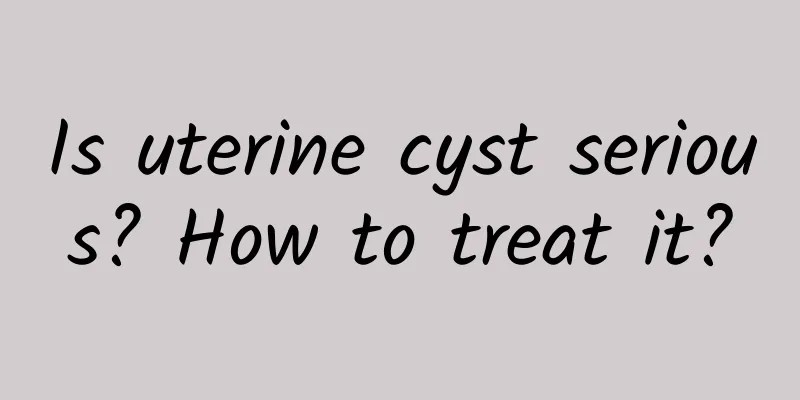Is uterine cyst serious? How to treat it?

|
The severity of uterine cysts depends on the specific circumstances. Mild cysts may have no obvious symptoms and can be observed regularly. However, if the cyst is large, accompanied by pain, irregular bleeding, or suspected to be a malignant lesion, it must be taken seriously and treated promptly, including medication, surgery, and lifestyle adjustments. 1. Possible causes Uterine cysts may be caused by a variety of factors, including abnormal hormone levels, chronic inflammation, or endometriosis. Long-term hormone imbalance can lead to cyst formation, while chronic gynecological inflammation may cause tissue hyperplasia. Genetic factors, lifestyle habits, and immune system abnormalities may also be potential causes. 2. Treatment methods 1. Drug treatment: For mild cysts or asymptomatic patients, doctors may recommend oral contraceptives or progesterone drugs to regulate hormone levels and inhibit further growth of cysts. The specific use of drugs should be carried out under the guidance of doctors. 2Minimally invasive surgery: If the cyst is large and causes obvious discomfort or is suspected to be malignant, laparoscopic surgery can be used to remove the cyst, which has less trauma and faster recovery. 3. Laparotomy: For malignant cysts, larger cysts or cysts in special growth locations, laparotomy may be required for removal, and further treatment strategies such as chemotherapy or radiotherapy will be determined based on the postoperative pathological results. 3. Daily conditioning 1. Balanced diet: Eat more foods rich in antioxidants, such as dark vegetables and fruits, and avoid irritating foods. 2 Appropriate exercise: such as yoga and walking, helps regulate hormone balance and improve immunity. 3 Regular check-ups: Especially for those with a family history or a history of gynecological diseases, it is recommended to undergo a gynecological ultrasound examination every year to detect potential problems early. Regular check-ups and scientific treatment are essential to ensure health. If you experience symptoms related to uterine cysts, you should seek medical attention as soon as possible for a clear diagnosis and take appropriate treatments under the doctor's advice to reduce risks and improve your quality of life. |
<<: Can I get pregnant and have a baby with endometriosis?
>>: Is cervical erosion and cervical hypertrophy easy to treat?
Recommend
What are the causes of ectopic pregnancy?
What are the causes of ectopic pregnancy? Ectopic...
What is the condition of cervicitis?
What is the condition of cervicitis? The symptoms...
Brief introduction to the various treatment methods for cervical hypertrophy
There are actually many treatments for cervical h...
Symptoms and treatments of amenorrhea Causes of amenorrhea
Amenorrhea refers to the cessation of menstruatio...
Why is there still brown discharge 15 days after abortion?
If brown discharge is still present 15 days after...
Acute and chronic cervicitis will show up in leucorrhea
Acute and chronic cervicitis will show up in vagi...
Is it serious to have uterine fibroids? Will uterine fibroids affect pregnancy?
How serious are uterine fibroids? Uterine fibroid...
Don't self-medicate for vulvar itching
Female friends often ask experts, what are the to...
What to eat for less menstrual flow
What should I eat when my menstrual flow is light...
Sitting for a long time will cause muscle weakness and damage your brain. Practice these 5 muscle strength training techniques every day and experience the improvement of your brain power in 8 weeks.
Not only does sitting for long periods of time ma...
Ointment for treating vulvar leukoplakia
Vulvar leukoplakia is a chronic skin disease, whi...
What is the difference between induced labor and artificial abortion? One induced labor equals several artificial abortions.
What is the difference between induced labor and ...
Principles of treatment of pelvic peritonitis
Pelvic peritonitis is a disease that is very harm...
Dietary conditioning methods for patients with irregular menstruation
Irregular menstruation is a common gynecological ...
Get rid of the big belly after giving birth and lose 12 kg by breastfeeding
Ally, 38 years old and 168cm tall, is a mother of...









